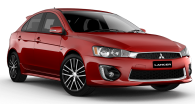At a time when most manufacturers are downsizing engines in the name of fuel economy, luxury car maker Jaguar has decided to take a different route.
The Tata owned British marque has updated its mid-sized XF range with a brace of larger, more powerful diesel and V8 engines that deliver better performance.
But, incredibly, they are more fuel efficient and produce less harmful carbon emissions than the engines they replace.
All engines are teamed with an enhanced version of the excellent ZF six-speed automatic which allows the driver to change gears like a manual.
Many other mechanical changes have been made along with some minor cosmetic touches, the most notable being new exterior mirrors.
The four-door XF which looks more like a coupe certainly seems to have struck a chord with Aussies since its launch here last year, as it now accounts for 65 per cent of the company's sales.
It will soon be joined by a striking new flagship the XJ limousine that is also set to adopt a more modern look.
Drivetrains
With the launch this week of the new XF, Jag has taken the opportunity to add a fire-breathing XF-R model, complete with a supercharged, 5.0-litre direct injection V8.
With 375kW of power and 625Nm of torque under foot, the R is capable of sprinting from 0-100km/h in just 4.9 seconds and on to an electronically limited top speed of 250km/h.
That's 23 per cent more power and 12 per cent more torque than the previous 4.2-litre V8, with fuel consumption rated at 12.6 compared to 12.5 litres/100km and carbon emissions 292 compared to 299g/km previously.
But it's the exciting new 3.0-litre twin turbo diesel, developed in conjunction with PSA Peugeot-Citroen, that stole the show, with 202kW and class-leading 600Nm of torque down low — a 33/38 per cent increase in power/torque.
With no real, discernible turbo lag, 500 of the 600Nm of torque is accessible within 500 milliseconds of planting your right foot, allowing the car put away the dash in 6.4 seconds.
And it is able to achieve this while using just 6.8 litres of fuel per 100km and producing only 179g/km of C02 (compared to 7.5 and 199 previously).
Quiet, smooth and responsive, it's without doubt one of the best diesels that we have ever driven.
The naturally aspirated V8 meanwhile produces 283kW and 515Nm (up 29 and 25 per cent) while the 3.0-litre V6 petrol engine with 175kW and 293Nm is the only carry over from the previous model.
Prices
Prices for the new XF start at $109,450 for the V6 petrol, $116,250 for the diesel, $147,900 for the V8 and $208,450 for the supercharged XF-R, which is distinguished by quad tailpipes, bonnet air inlets, deeper front air dam and a tiny lip spoiler atop the boot.
Driving
We got to put the cars through their paces over two days and several hundred kilometres of country roads.
Performance is strong and convincing across the range in keeping with Jag's aspirations to build beautiful, fast cars.
The diesel and naturally aspirated V8 models exhibit a little too much body roll for our liking, but it should be kept in mind that this is a tourer rather than full blown sports car.
The steering too lacks some feel off centre, a trait not exhibited by the XF-R with its quicker steering rack.
Overall as might be expected the XF-R has a more secure, planted feel than the previous S Type R, thanks to Bilstein dampers, a new variable suspension system and a trick electronic diff — the previous CATS system has been dropped.
Not only do the cars look and go well, but they are also finished to a high standard.
Our one minor disappoint is Jaguar's reluctance to include a digital speedo as part of the centre computer screen. We're told by Jag's ‘Mr XF' Kevin Stride that only one other person in the entire world has requested this facility.
Jaguar XF 2009: 4.2 SV8 Supercharged
| Engine Type | Supercharged V8, 4.2L |
|---|---|
| Fuel Type | Premium Unleaded Petrol |
| Fuel Efficiency | 12.6L/100km (combined) |
| Seating | 5 |
| Price From | $23,210 - $28,600 |
Pricing Guides










































.png)


.jpg)

